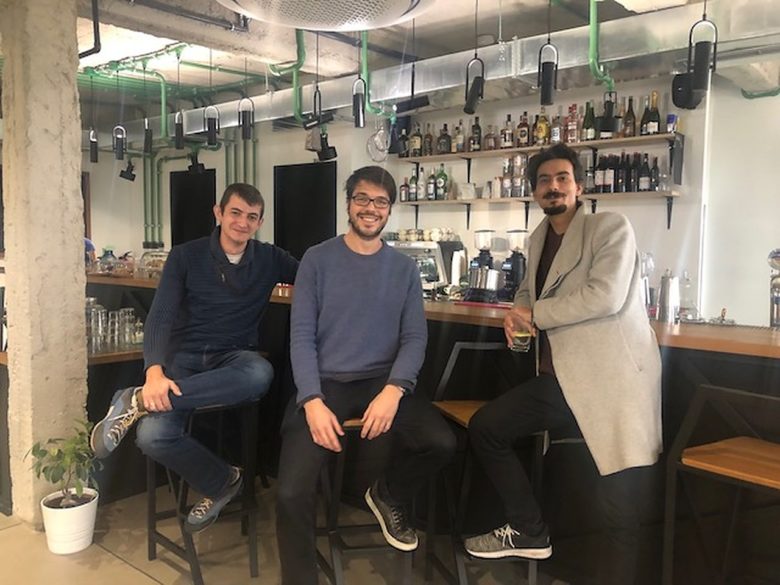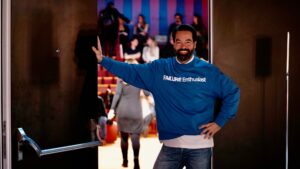Puzl CowOrKing: Expanding, Purchasing Buildings And Raising €15m

The first IT only coworking space in Bulgaria Puzl CoWorKing just turned four years. Also, the end of the year in which Puzl should have launched the first new location abroad is approaching. Over a year ago co-founder Thibaut Taittinger announced their ambitious plans to expand in the CEE region and to connect the regional IT community. As we continued hearing about the expansion, but not really seeing it happen, we began to wonder – is it hard to enter another coworking market, is it hard to find the right people, is it the WeWork saga that made everyone doubt the coworking business…what is causing the delay and the silence.
Within the past four years the space in Sofia evolved to a co-working of 7000 m2 and €2M was invested in its renovation, and there over 80 companies live and work together – startups, engineering teams of larger companies, but also freelancers. Puzl is known as the heart of the IT ecosystem in Sofia. As the location in Sofia has been developing, adding new office spaces and a new rooftop cafe-bar, the planned expansion has been lagging. Turns out, the team had to face quite different challenges from what we suspected. Yet the ambition is not stifled, as we can see in this conversation with CEO Thibaut Taittinger, COO Alex Tokmakchiev and Daniel Minchev, Puzl’s Construction Manager.
Trending Topics: The news of Puzl expanding has been around for almost two years now. But you haven’t opened up the Budapest coworking space yet. What’s going on?
Thibaut Taittinger: We were set to start it last year. For a period of one full year, we were negotiating a big project – a few buildings of 40 000 m2. We reached an agreement and we signed the contracts and sent to the owner of the company. As we didn’t hear anything from their side, three days later we called to hear “We are very sorry, our CEO changed his mind and decided to triple the price.” We pulled out the deal. We could have assumed the reason was that someone else showed interest to rent the space, but as of now – still, it’s abandoned. Anyway, we had to regroup and start all over.
Now, we use Google maps to find new locations and we have a list of real estate agencies. It’s funny that through Google maps we’ve looked at close to 100 buildings, and whenever we talk to agencies – we know all about the buildings they are offering. We should probably open up a real estate agency over there (laughs).
For the past 6 months, we found two locations we really like and we’ve been doing due diligence and analyses. One of them is our priority – two buildings of 12 000 m2 we want to purchase (as a comparison the current space in Sofia is 7000 m2 – ed. n.). We have already discussed the conditions with the owner and sent the offers. The type of properties we are looking at are very hard to get as we don’t try to get random A class buildings, but something with heritage and spirit. We may build walls, but the more important part is the content and the community, and this requires a special type of place.
You were after a 40 000 m2 building?
T.T.: Well, we scaled down now, but yes. It was an incredibly beautiful building – UNESCO heritage. But the kind of difficult to get too. Actually, these are the moments when investors come quite handy. I literally got slapped on hand from my investors and forced to come back to reality and focus on places, which are still unique, but easier.
You just said “purchase”. What does this mean? To date, Puzl has been renting the spaces. And if that’s the new plan, how much will that cost?
T.T.: Correct. It’s about €15m. It’s still undefined because we haven’t finished all the planning, but it’s between €15 and €20m. We have some soft commitments and investors. But we’ll do a mix. Probably we’ll raise some equity funding in our UK company and we’ll be raising loans. We give 8% interest per year, for a 6 years period, and during this period we’ll repay 50% of the principal on a quarterly basis. We are looking at the European VC market, not touching the US for now.
We’ll be raising in phases. For our projects next year, we need to raise €10m.
What’s the potential in Budapest? One would think they have a more mature ecosystem and logically more advanced coworking market.
T.T.: The potential in Budapest is bigger than the potential in Sofia, because the city is bigger and attracts more foreigners. At the moment, there are less coworking spaces than in Sofia. If I have to be honest, Sofia is one of the most competitive, if not the single most competitive, coworking markets in Central and Eastern Europe. And I’m speaking not only in terms of square meters, but also in terms of quality. Over there, the main players are Regus, NewWork and HubHub and there are several other small spaces.
Have you ever thought of a second location in Bulgaria?
T.T.: It has come up. We haven’t done it because we felt that it was more important to take a step abroad.
Dani: If you start opening up more spaces in Bulgaria, it’s so much easier and tempting that you wouldn’t start expanding abroad.
Where else abroad?
T.T.: Budapest, Bucharest, Prague, Vienna, Athens, Skopie, Belgrade.
Will the “IT only” strategy remain the focus for the expansion?
T.T.: The strategy is the same. In terms of growth, we’ll be releasing in phases. We should release the first 2000 m2 next summer. As soon as we release the first 2000 m2, we’ll focus on the next locations.
We already recruited our local co-founders in Budapest.
What does recruiting co-founders in another market mean?
Alex Tokmakchiev: We already have our Chief Navigation Officer in Budapest – Zsofi Toth. Zsofi’s been with us for six months now and she comes to Sofia to spend time with the team and learn how we operate the business. The team over there will operate more or less independently, there will be some supervision from Sofia of course, but limited.
They get a stake in the UK parent company. We don’t want to dilute ourselves in every country, that would be too complex financial structure… you always have to be prepared for an exit, although that’s nothing that we are looking at in the midterm. The most important thing to be considered is that everyone needs to be working towards the same goal. If everyone gets equity in their local coworking and local structure, there’s always the risk that the local team cares more about local stuff, and not what the whole group would be achieving.
At the end of the day, what we want to create is a well connected regional IT community, and to do so, we need to be one team, not separated hubs here and there.
In this regard, unlike Sofia, where we have the operations team but also our business growth team, the renovation unit, in the other countries there we’ll be only the operations.
Thibaut Taittinger: So Dani, how are you planning to handle renovations from Sofia?
(everyone laughing)
Daniel Minchev: Renovation in Hungary is generally a bit less complex and takes less time in terms of legalization. Yet, every second building there has monument protection and one need to ask authorities in case something has to be changed. They are, however, strict on deadlines. The biggest challenge is to handle it from here, we are now creating the process. For some of the activities, we’ll be sending companies we’ve worked with and trust from Bulgaria. In addition, development there is 30-50% more expensive right now.
And speaking of a connected ecosystem, will there be any plans that allow your members to sit in different offices in the region with one subscription?
A.T.: Yes. Every member of any coworking will be able to visit other coworkings as part of their membership.
What’s the biggest challenge right now?
A.T.: To test whether the processes here can be scaled properly. Although we are a coworking space, we come from IT so we implemented scrum everywhere. Here, all of us are around the same thing, but how will that work with two and more locations…
T.T.: We also have a quite different culture and management. On the one hand, we don’t define budgets. I think budgets are something that only makes people stop thinking and following processes. At the same time, we have a different management approach. We have two managers who split the roles. We want everyone to be a specialist. So far it’s been working.
What start do you expect in Budapest? How are you planning to enter this new market and what are the expectations for capacity occupation?
T.T.: Here, we started the first space with 30% occupancy, the second one with 60%. So hopefully, given that we already have an established brand, we’ll start with 50%.
A.T.: We need a lot of early engagement with the community. Meaning that we’ll be going around a lot to meet people and talking about what we are planning.
D.M.: And let’s not forget, we are going after emblematic buildings, which is going to create additional buzz around us.
So where’s that building?
D.M.: Somewhere in Budapest (laughs). It’s not downtown, that’s what I can say.
Ok, all sound great. But how is your current business going?
T.T.: We are over a million euro revenue, and we are profitable. Although this might be a mistake we’re making – we are staying profitable, instead of burning money to grow. Puzl was profitable three months after it was opened, by the way.
And how long do you think it will take you to return the €15m you are planning to raise?
D.M.: Honestly, to renovate everything in Budapest we’ll need three years. Once it’s renovated, we’ll need 5-6 years to return the cash. But in the meantime, we’ll be doing other things as well.
It’s been a tough year for the coworking industry. So the obvious question is: How are you different from WeWork?
T.T.: Well, it’s a pretty different model. Let me give you some background – WeWork is renting A class buildings, has a very fast time to market – six weeks. They are literally putting glass and furniture. Since coworking is a margin business, this makes WeWork expensive and makes their margins smaller. Additionally, they follow the American model of growing without thinking of profitability. The model has always been flawed.
We want to buy buildings. The renovations that we are doing, are the renovations everyone who owns a building would do. So it makes more sense to invest in a building you own.
What I’m trying to say is that WeWork’s model has been extremely risky from day 1. Working on short margins… I don’t see this working. They’ve been faking this is a working model. Who are their investors in the past three years? Only one – Softbank.
You speak about margins all the time. What are the margins in this business?
T.T.: I cannot give you numbers, it’s anyway not about the numbers. Here’s what matters. When we started here we were the most expensive coworking by 5-10%. Since we’ve started we’ve increased the price by 10% and we are now one of the cheapest. Why haven’t we increased the prices more? Because we believe in fair business. The margins were set when we started the business. We could always increase prices because of inflation or something else, but that’s not the way we are.
A.T.: This would be a contradiction to who we said we are in the very beginning – part of the community. If we are squeezing this community for money, that’s not going to last long.
You might also want to take a look at the Sofia coworking map here:
+++ The Hubs of the entrepreneurial mindset in Sofia
+++ Betahaus 2.0: The first co-working space in Bulgaria moves to the next level..and location




























